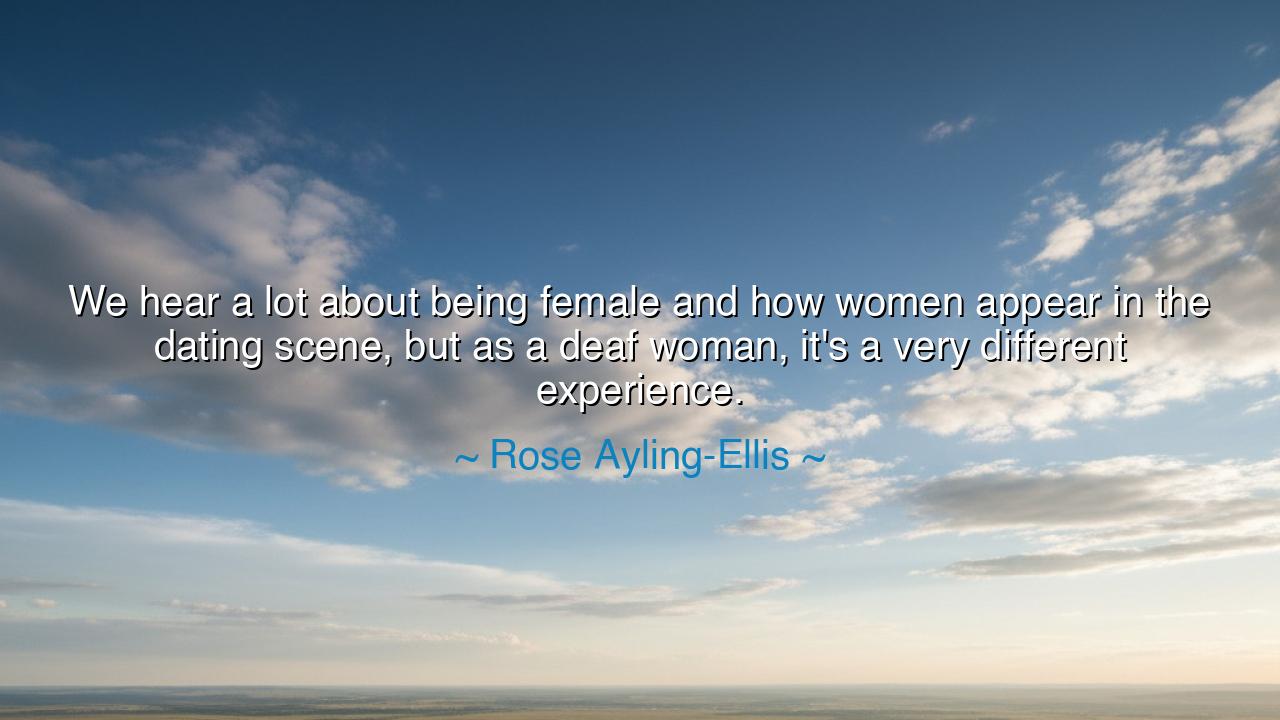
We hear a lot about being female and how women appear in the
We hear a lot about being female and how women appear in the dating scene, but as a deaf woman, it's a very different experience.






The words of Rose Ayling-Ellis — “We hear a lot about being female and how women appear in the dating scene, but as a deaf woman, it's a very different experience.” — are spoken softly, yet they resonate with the strength of mountains. They remind us that identity is not a single thread but a tapestry — woven from gender, ability, perception, and circumstance. In her reflection, we hear not complaint, but truth; not bitterness, but clarity. It is the voice of one who has learned that the world, though rich in voices, too often forgets to listen. Her words are a call to awaken our empathy — to recognize that behind every story lies another, quieter one, waiting to be heard.
Ayling-Ellis speaks of difference, not as division, but as a reality of the human experience. She reminds us that even within the shared paths of womanhood, each traveler walks through a landscape shaped by her own challenges. For most, the “dating scene” is a realm of curiosity, judgment, and desire — a dance of words, gestures, and unspoken signals. But for the deaf woman, these cues — the glances, the tones, the music of voice — move in silence. What others take for granted becomes a labyrinth of interpretation. To love in silence is to love with deeper sight, to read emotion not in sound, but in movement and intention. It is to seek connection not through noise, but through the profound language of presence.
The ancients would have recognized in her words the wisdom of perception beyond hearing. In the temple of Delphi, the priestess Pythia spoke not in clear speech but in trance — her meaning grasped not by sound but by the understanding of spirit. Likewise, those who live in silence often see what others miss. They hear with their eyes, they listen with their hearts. Yet the world, built upon the spoken word, too often mistakes silence for absence. Rose Ayling-Ellis, by voicing her truth, restores silence to its rightful dignity — not as a lack, but as another form of expression, another way of being fully human.
Her experience also speaks to a greater human truth: that difference reveals depth. For those who move through the world outside its easy norms — whether through deafness, disability, or any divergence — life requires a constant translation. Every conversation becomes a negotiation between worlds, every act of connection a triumph of patience and courage. The deaf woman in the dating world is not only seeking love; she is also teaching others how to see her clearly, beyond misconception or pity. In this way, her experience becomes not only personal but transformative — it challenges others to love more consciously, to communicate more honestly, and to listen beyond sound.
History, too, gives us examples of this profound truth. Consider the life of Helen Keller, who, though both deaf and blind, forged a bond with the world through sheer will and the tireless guidance of her teacher, Anne Sullivan. To most, her silence and darkness would have seemed an impenetrable barrier — yet through patience and touch, she opened a dialogue between herself and humanity. Keller wrote that the highest result of education is tolerance — the ability to see through another’s eyes, to hear through another’s heart. Rose Ayling-Ellis’s words carry the same spirit: to remind the world that understanding does not come from speech alone, but from attention, compassion, and shared humanity.
The lesson of her saying reaches far beyond the realm of dating. It teaches us to remember that every human encounter — in love, in friendship, in life — depends not on what we say, but on how deeply we choose to understand. In a world saturated with voices, the greatest act of love may simply be to listen without assumption. To look at another person — truly look — and see their entire being, their silence and strength alike, is to honor them as they are. Love, then, becomes not performance, but recognition: the meeting of souls who no longer need to explain themselves to be seen.
So let us learn from the wisdom of Rose Ayling-Ellis. Let us be slower to speak and quicker to perceive. Let us make space for silence — not as emptiness, but as presence. For in that silence lies the truth of all connection: that love is not made by sound, but by understanding; not measured by words, but by the courage to see another’s world as they see it. And when we learn to listen in this way — when we learn to hear even the quietest hearts — we will find that the world itself grows deeper, kinder, and infinitely more beautiful.






AAdministratorAdministrator
Welcome, honored guests. Please leave a comment, we will respond soon